Zoom
Trash

Teaching Ideas. Genre(s): Adventure A young girl helps a tiny boy to fly home before it's too late!
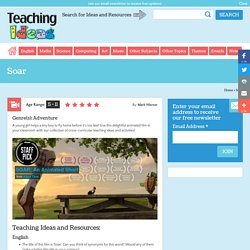
Use this delightful animated film in your classroom with our collection of cross-curricular teaching ideas and activities! English. Retrieval Practice: A Powerful Strategy to Improve Learning — Summary of Recommendations. Use retrieval practice as a learning strategy, not as an assessment tool.Use retrieval practice frequently, as often as possible.
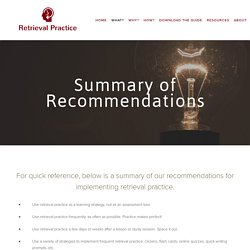
Practice makes perfect! Use retrieval practice a few days or weeks after a lesson or study session. Space it out.Use a variety of strategies to implement frequent retrieval practice: clickers, flash cards, online quizzes, quick writing prompts, etc.Use a variety of question types: fact-based, conceptual, and higher order/transfer.Encourage metacognition by including feedback (right/wrong feedback, explanation feedback, etc.).Remain confident that challenging learning (via retrieval practice) is a good thing! Examine your teaching and studying strategies: Do they focus on getting information “in” or “out? " Is learning challenging, or is learning easy and “fluent? " For more information, please browse additional sections of this website, including Strategies for Educators, FAQs, and Download the Guide. Character Day. Character Day is an annual global day devoted to developing who we are and who we want to be in the world.

The Choice Explosion. Lansing, W.Va. — A few years ago, the social psychologist Sheena Iyengar asked 100 American and Japanese college students to take a piece of paper.

On one side, she had them write down the decisions in life they would like to make for themselves. On the other, they wrote the decisions they would like to pass on to others. The Americans filled up the side for decisions they want to decide for themselves. Where to live. How to Get Past Negativity Bias in Order to Hardwire Positive Experiences.
It’s helpful to know that the brain is plastic and can adapt to challenges.
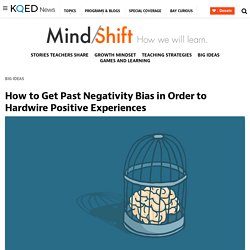
And when it comes to learning new things, we can build up mental resources through intentional effort. People can get better at realizing self-regulation, executive functions, a sense of perspective or meaning, positive emotions like gratitude, a sense of strength and the feeling of being cared about. How to Turn on the Part of Your Brain That Controls Motivation.
We know we should put the cigarettes away or make use of that gym membership, but in the moment, we just don’t do it.
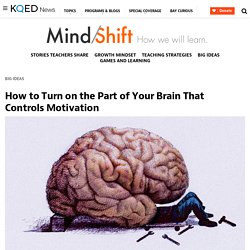
There is a cluster of neurons in our brain critical for motivation, though. What if you could hack them to motivate yourself? The researchers stuck 73 people into an fMRI, a scanner that can detect what part of the brain is most active, and focused on that area associated with motivation. Recently Uploaded Videos. Mindset Kit - Growth Mindset For Teachers. Brain Science - IAE-Pedia. Information Age Education (IAE) is an Oregon non-profit corporation created by David Moursund in July, 2007.
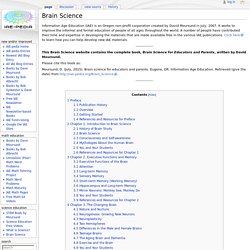
It works to improve the informal and formal education of people of all ages throughout the world. A number of people have contributed their time and expertise in developing the materials that are made available free in the various IAE publications. Click here to learn how you can help develop new IAE materials. This Brain Science website contains the complete book, Brain Science for Educators and Parents, written by David Moursund. The Marshall Memo Admin - Issues. 1.
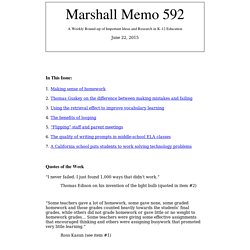
Making sense of homework 2. Thomas Guskey on the difference between making mistakes and failing 3. Using the retrieval effect to improve vocabulary learning. The Backwards Brain Bicycle - Smarter Every Day 133. Twitter SmarterEveryDay.
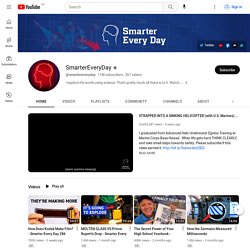
Five psychological findings every history teacher should know. This text is somewhere between what I planned to say and what I did say during my session at the Historical Association’s annual conference in Bristol yesterday, with a few reflections in italics.
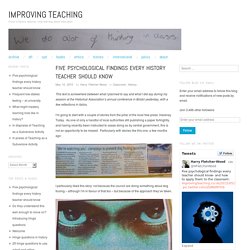
I’m going to start with a couple of stories from the pillar of the local free press: Hackney Today. As one of only a handful of local authorities still publishing a paper fortnightly, and having recently been instructed to cease doing so by central government, this is not an opportunity to be missed. Particularly with stories like this one, a few months ago: Mapping Pedagogies For Learning Design. Visual Thinking Center. Palincsar Reciprocal Teaching.pdf. Mind Mapping and Visualization. Teaching Kids Skills For Deep Reading on Digital Devices.
Digital Tools There’s no doubt that the experience of reading online is different than reading in print, but does it affect comprehension? While several studies have found student comprehension and retention are lower on digital devices, could it be that students just need to learn the right tools to enhance their digital reading? Maria Konnikova explores the research and theories behind reading in her New Yorker column. The Importance of Not Knowing – Lingua Franca. It’s graduation season, a time when we celebrate the academic accomplishments of students. At this moment when we are celebrating learning, I think it is important to remember the importance of not always knowing—a message I had the opportunity to share a few years ago at a high-school commencement in Cleveland.
Read, Kids, Read. Can reading make you smarter? Character Strengths - Let It Ripple.